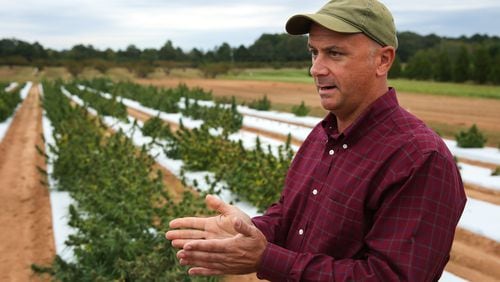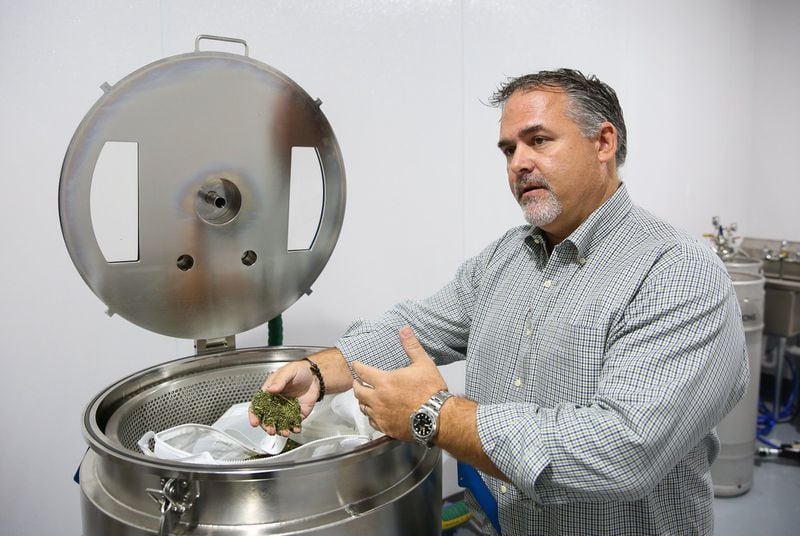Hemp farming has finally gotten the green light to begin in Georgia, bringing a new crop that will sprout this summer.
Farmers will soon be able to grow hemp, which will then be processed into CBD oil, a popular product used for anxiety and sleeplessness. CBD oil is already sold in stores across Georgia, but it's imported from other states.
The prospects for the Georgia hemp industry to start this year were in doubt until the U.S. Department of Agriculture approved the state's hemp plan this month.
The federal government had put Georgia's plan on hold late last year but gave it the go-ahead when state legislators appropriated $200,000 to regulate the program in this year's budget and proposed additional funding next fiscal year.
“With everything online and all systems go, our phones are ringing daily with farmers,” said Thomas Farmer, a co-founder of Second Century Ag, which plans to distribute hemp starter plants to farmers and then process grown hemp at a facility in Ocilla. “It’s a relief that it happened, without a doubt. We were looking forward to moving forward.”
Hemp farmers and processors rushed to obtain licenses when state government began accepting applications last Monday. The Georgia Department of Agriculture received 57 applications for hemp farming licenses and five applications for hemp processing licenses in the first four days of the program.
Hemp and marijuana both come from the cannabis plant, but hemp varieties contain little or no THC, the compound that gives marijuana users a high. State inspectors will test hemp to ensure it contains less than 0.3% THC.
It will take at least 20 days for hemp licenses to be approved, and then farming can start.
"Georgia has the ability to be a significant player in the country, particularly given our climate," said Kevin Quirk, the CEO for Harvest Connect in Roswell. "People say they're not sure how it's going to grow in the red clay. Guess what, it's growing really well in tests" by the University of Georgia.
Quirk plans to sell CBD oil through the company’s Graceleaf brand, which he hopes will be available in drugstores and high-end grocery stores. He’ll also sell it at the CBD Store and More, his company’s retail operation.
CBD oil made in Georgia is expected to reach store shelves by the end of the year, if not sooner.
Georgia has been slow to adopt hemp farming, trailing 35 other states that already grow the product. Some of the nation’s largest hemp producers are in the South, including Kentucky, North Carolina and Tennessee.
But Georgia’s warm climate and long growing season position companies in the state to compete on a global scale, said Don Barden, the CEO for GA Xtracts, which has facilities in Union Point and Watkinsville.
“The ultimate goal is for hemp grown in the state of Georgia to be the next Idaho potatoes, California raisins or Vidalia onions,” Barden said. “I’m excited beyond belief. This means we can all finally get to work.”
Hemp will be planted around June 15 and harvested roughly 90 days later, Barden said. Then it will be processed into CBD oil and shipped to stores.
GA Xtracts plans to hire between 200 and 250 people by July to work at the company’s processing facility.
It will cost farmers a fee of $50 per acre annually, up to $5,000, to grow hemp in Georgia, according to the state’s licensing rules. Processors will have to pay an initial $25,000 fee followed by a $10,000 annual fee.
The state Agriculture Department is accepting applications online for hemp farming licenses. Once an application is received, the department will verify the applicant’s information, run background checks, collect payments and issue licenses.
Licensing may be delayed beyond 20 days after applications are completed because agriculture licensing staff is stretched thin as they focus their efforts on helping farmers respond to the coronavirus, said Julie McPeake, a state Agriculture Department spokeswoman.
“We certainly are trying to get it turned around as quickly as possible,” McPeake said.
Hemp farming in Georgia was made possible through both federal and state approval.
Congress authorized a national hemp-growing program when it passed the Farm Bill in 2018, and then federal hemp farming rules were finalized in the fall. Meanwhile, the Georgia General Assembly passed a bill in 2019 to allow hemp farming.
Many other states had already produced hemp under a pilot program authorized by the 2014 Farm Bill, but Georgia didn’t participate.
Under Georgia's hemp rules, licensees will have to undergo inspection of their hemp crops, and if any sample exceeds the THC limit, the entire crop would be destroyed.
About the Author









